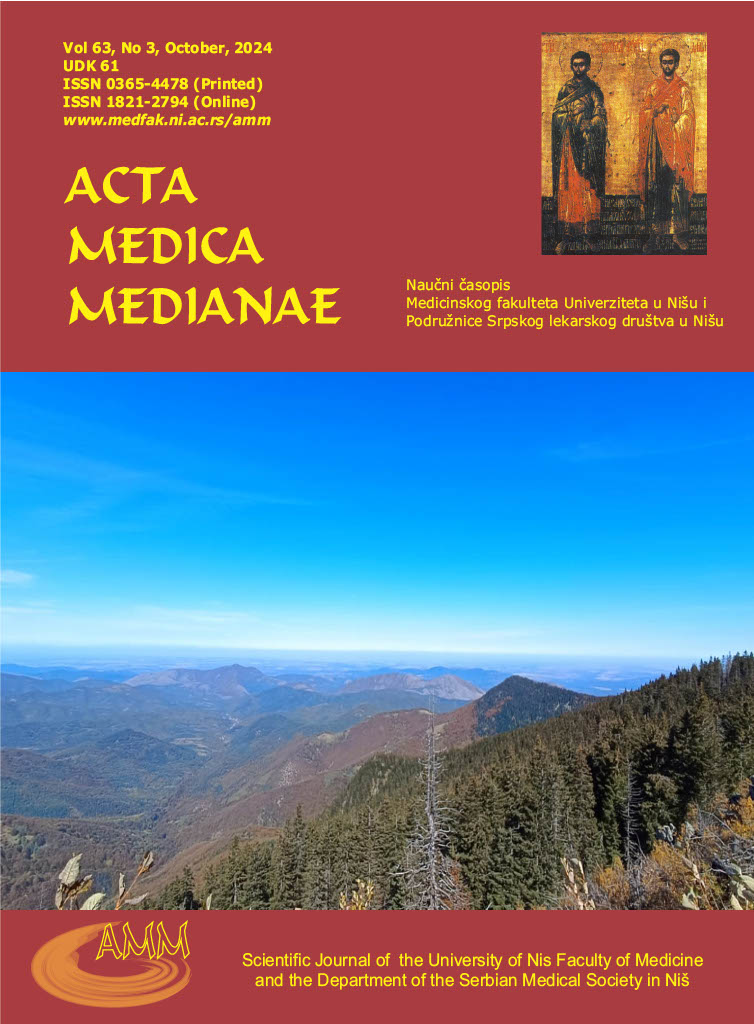SELF-CARE ACTIVITIES AS PREDICTORS OF GOOD GLYCAEMIC CONTROL IN DIABETES: DIFFERENCES BETWEEN TYPE 1 AND TYPE 2 DIABETES
Abstract
Diabetes mellitus is a chronic disease that is mostly controlled by the affected individual nowadays. Activities in self-control of diabetes include self-monitoring of blood glucose, eating a healthy diet, being physically active, taking the recommended medication, and consulting health care professionals. Different studies have shown that educational and psychosocial interventions can have a significant effect on improving diabetes self-control and reducing complications. The aim of this study was to examine the differences in self-care activities between patients with Type 1 and Type 2 diabetes as well as the role of these activities in predicting good glycaemic control. Our results suggest that in Serbia people with Type 1 diabetes have a much harder task in achieving good glycaemic control than people with Type 2 diabetes, even when there is no difference between these groups in practicing the majority of self-care activities. In future, education for people with Type 1 diabetes should emphasise monitoring blood glucose. For both types of diabetes, a healthy diet should be addressed.
References
American Diabetes Association. Standards of Medical Care in Diabetes—2013. Diabetes Care 2013;36(Supplement_1):S11–66. [CrossRef] [PubMed]
Barlow J, Wright C, Sheasby J, Turner A, Hainsworth J. Self-management approaches for people with chronic conditions: a review. Patient Educ Couns 2002;48(2):177–87. [CrossRef] [PubMed]
Boren SA, Fitzner KA, Panhalkar PS, Specker JE. Costs and benefits associated with diabetes education a review of the literature. Diabetes Educ 2009;35(1):72–96. [CrossRef] [PubMed]
Dennick K, Sturt J, Speight J. What is diabetes distress and how can we measure it? A narrative review and conceptual model. J Diabetes Complications 2017;31(5):898–911. [CrossRef] [PubMed]
Ducat L, Philipson LH, Anderson BJ. The Mental Health Comorbidities of Diabetes. JAMA 2014;312(7):691. [CrossRef] [PubMed]
Hampson SE, Skinner TC, Hart J, Storey L, Gage H, Foxcroft D, et al. Effects of educational and psychosocial interventions for adolescents with diabetes mellitus: a systematic review. In: Database of Abstracts of Reviews of Effects (DARE): Quality-assessed Reviews [Internet]. Centre for Reviews and Dissemination (UK); 2001; 5(10): 1-79. [CrossRef] [PubMed]
Magliano D, Boyko EJ. IDF diabetes atlas. 10th edition. Brussels: International Diabetes Federation; 2021.
Mayberry LS, Osborn CY. Empirical Validation of the Information–Motivation–Behavioral Skills Model of Diabetes Medication Adherence: A Framework for Intervention. Diabetes Care 2014;37(5):1246–53. [CrossRef] [PubMed]
McKnight JA, Wild SH, Lamb MJE, Cooper MN, Jones TW, Davis EA, et al. Glycaemic control of Type 1 diabetes in clinical practice early in the 21st century: an international comparison. Diabet Med 2015;32(8):1036–50. [CrossRef] [PubMed]
Moura N dos S, Lopes BB, Teixeira JJD, Oriá MOB, Vieira NFC, Guedes MVC. Literacy in health and self-care in people with type 2 diabetes mellitus. Rev Bras Enferm 2019;72(3):700–6. [CrossRef] [PubMed]
Osborn CY, Egede LE. Validation of an Information–Motivation–Behavioral Skills model of diabetes self-care (IMB-DSC). Patient Educ Couns 2010;79(1):49–54. [CrossRef] [PubMed]
Peyrot M. Behavior change in diabetes education. Diabetes Educ 1999;25(6_suppl):62–73. [CrossRef] [PubMed]
Reed J, Ashton H, Lawrence J, Hollinghurst S, Higgs E. Diabetes self-management: how are we doing? Pract Diabetes Int. 2003;20(9):318–22. [CrossRef]
Rubin RR, Peyrot M. Psychological issues and treatments for people with diabetes. J Clin Psychol 2001;57(4):457–78. [CrossRef] [PubMed]
Snoek FJ. Psychological Aspects of Diabetes Management. 2002; [CrossRef]
Standards of Medical Care for Patients With Diabetes Mellitus: American Diabetes Association. Diabetes Care. 1994 Jun 1;17(6):616–23. [CrossRef] [PubMed]
Stratton IM, Adler AI, Neil HAW, Matthews DR, Manley SE, Cull CA, et al. Association of glycemia with macrovascular and microvascular complications of type 2 diabetes (UKPDS 35): a prospective observational study. Bmj 2000;321(7258):405–12. [CrossRef] [PubMed]
Toobert DJ, Hampson SE, Glasgow RE. The summary of diabetes self-care activities measures results from 7 studies and a revised scale. Diabetes Care 2000;23(7):943–50. [CrossRef] [PubMed]

